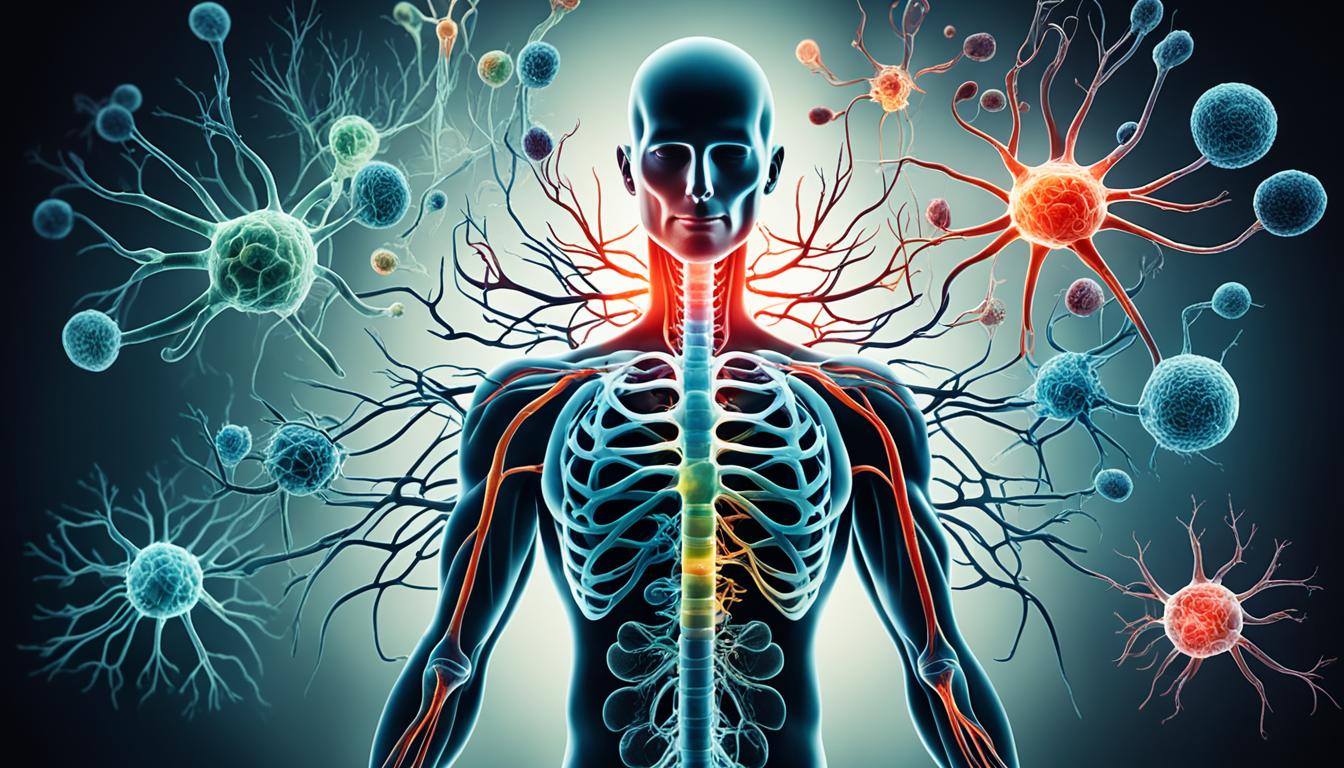Multiple system atrophy (MSA) is a rare, degenerative neurological disorder. It affects the body’s autonomic functions and motor control. You may have heard of it by its old names, like Shy-Drager syndrome or olivopontocerebellar atrophy.
MSA has symptoms similar to Parkinson’s disease. These include slow movement, rigid muscles, and trouble balancing.
Treating MSA aims to manage its symptoms with medications and lifestyle changes. Unfortunately, there’s no known cure for it. The disease slowly gets worse over time and can eventually lead to death.
Although not widely available, stem cell therapy offers hope as a treatment for MSA. However, its effectiveness still needs more research to be proven.
Key Takeaways:
- Multiple system atrophy (MSA) is a rare, degenerative neurological disorder that affects autonomic functions and motor control.
- MSA shares symptoms with Parkinson’s disease, such as slow movement, rigid muscles, and poor balance.
- Treatment for MSA focuses on managing symptoms through medications and lifestyle changes.
- Stem cell therapy is a promising area of research for MSA treatment, but its effectiveness is not yet proven.
- MSA is a progressive condition that leads to death.
Symptoms of Multiple System Atrophy (MSA)
Multiple system atrophy (MSA) is a complex disease with many symptoms. It includes issues with movement and body control. These symptoms split into two main types: parkinsonian and cerebellar issues.
Parkinsonian Type
The parkinsonian type of MSA leads to issues moving like a person with Parkinson’s might. People with this type may have:
- Stiff muscles and trouble moving normally.
- Problems bending their arms and legs smoothly.
- Move slower than usual.
- Experience tremors which can cause shaking.
- Speak with a softer voice than before.
- Find it hard to stand or move in balance.
Cerebellar Type
The cerebellar type affects coordination and overall motor control. It can cause:
- Difficulty coordinating movements, known as ataxia.
- An unsteady gait or walk.
- Issues with maintaining balance, increasing fall risks.
- Problems with clear speech due to muscle issues, called dysarthria.
- Vision troubles like blurred or moving images.
- Trouble swallowing and chewing, making eating difficult.
Autonomic Dysfunction
MSA also involves autonomic dysfunction. This means the body’s involuntary functions can be affected. Symptoms include:
- Postural hypotension which causes dizziness when standing.
- Problems controlling the bladder and bowels.
- Irregularities in sweat production, causing too much or too little sweat.
- Difficulties in sleeping well.
- Loss of sexual drive and function.
- Heart and mood issues, including depression and anxiety.
The symptoms and their severity can change from person to person. Early detection and managing symptoms quickly are important for the best care. This is needed for everyone with MSA.
| Motor Symptoms | Autonomic Dysfunction |
|---|---|
| Stiff muscles | Postural hypotension |
| Difficulty bending arms and legs | Urinary and bowel dysfunction |
| Slow movement (bradykinesia) | Changes in sweat production |
| Tremors | Sleep disorders |
| Soft voice | Sexual dysfunction |
| Problems with posture and balance | Cardiovascular problems |
Causes and Prognosis of Multiple System Atrophy (MSA)
The exact cause of MSA is a mystery. Scientists are studying genetic and environmental clues. MSA leads to the breakdown of brain areas like the cerebellum, basal ganglia, and brainstem. Tissue from MSA patients shows a buildup of alpha-synuclein protein under a microscope.
The outlook for someone with MSA can vary. But this disease gets worse over time, ending in death usually within 7 to 10 years from when symptoms first show. As MSA progresses, breathing trouble during sleep and falls from unsteady balance become more common. People might find it harder to move, take care of themselves, and speak. Swallowing and breathing also become harder.
The exact reasons behind MSA are still unknown. But, research is trying to uncover the disease’s roots. MSA is known for the shrinking and damage of certain brain parts, along with the buildup of alpha-synuclein protein. Finding out more about the causes and outlook of MSA is key to better treatments and life quality for those living with it.

